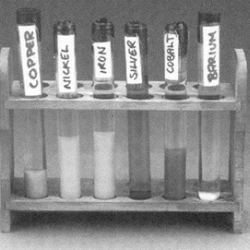Source Institutions
Source Institutions
Add to list Go to activity

This is written as a static display, but can easily be adapted to a hands-on experiment for learners to conduct. Sodium phosphate, a clear colorless solution, is combined with six different metal ion solutions. Each metal (copper, nickel, iron, silver, cobalt, and barium) forms a different color and texture precipitate. Learners discover that a chemical reaction can be identified by a color change, and formation of a precipitate. They also learn that metals can be identified by their precipitates. For safety reasons, this activity should be conducted as a demonstration for younger audiences.
- 10 to 30 minutes
- 10 to 30 minutes
- $5 - $10 per group of students
- Ages 11 - adult
- Activity, Demonstration, Exhibit, Experiment/Lab Activity
- English
Quick Guide
Materials List (per group of students)
- Six large test tubes (each should hold at least 25 ml+) with rubber stoppers to fit
- One test tube rack to display tubes
- 3.80 g Na3PO4 * 12H2O (sodium phosphate) (potassium phosphate will also work)
- 0.62 g CuSO4 * 5H2O (copper (II) sulfate) (copper (II) nitrate will also work)
- 0.73 g Ni(NO3)2 * 6H2O (nickel (II) nitrate)
- 0.59 g CoCl2 * 6H2O (cobalt (II) chloride) (cobalt (II) nitrate will also work)
- 0.68 g FeCl3 * 6H2O (iron (III) chloride) (iron (III) nitrate will also work)
- 0.58 g AgNO3 (silver nitrate)
- 0.63 g Ba(NO3)2 (barium nitrate)
- Deionized water (dH2O) (keep 200 ml on hand)
Subjects
-
Physical Sciences
-
Chemistry
- Chemical Reactions
- Solutions
-
Chemistry
Audience
To use this activity, learners need to:
- see
- see color
- read
Learning styles supported:
- Involves hands-on or lab activities
Other
This resource is part of:
Access Rights:
- Free access
By:
Rights:
- All rights reserved, Oregon Museum of Science and Industry, 1997
Funding Source:
- National Science Foundation
